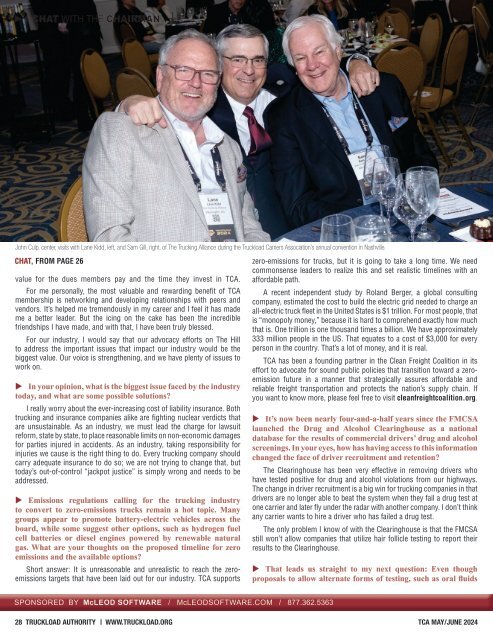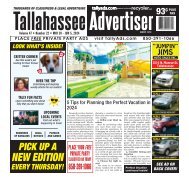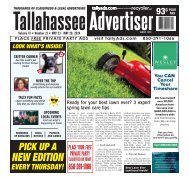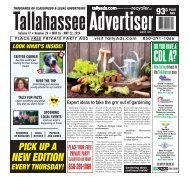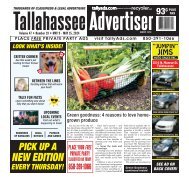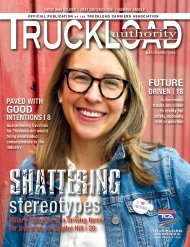TLA66_AllPages
You also want an ePaper? Increase the reach of your titles
YUMPU automatically turns print PDFs into web optimized ePapers that Google loves.
A CHAT WITH THE CHAIRMAN<br />
John Culp, center, visits with Lane Kidd, left, and Sam Gill, right, of The Trucking Alliance during the Truckload Carriers Association’s annual convention in Nashville.<br />
CHAT, FROM PAGE 26<br />
value for the dues members pay and the time they invest in TCA.<br />
For me personally, the most valuable and rewarding benefit of TCA<br />
membership is networking and developing relationships with peers and<br />
vendors. It’s helped me tremendously in my career and I feel it has made<br />
me a better leader. But the icing on the cake has been the incredible<br />
friendships I have made, and with that, I have been truly blessed.<br />
For our industry, I would say that our advocacy efforts on The Hill<br />
to address the important issues that impact our industry would be the<br />
biggest value. Our voice is strengthening, and we have plenty of issues to<br />
work on.<br />
u In your opinion, what is the biggest issue faced by the industry<br />
today, and what are some possible solutions?<br />
I really worry about the ever-increasing cost of liability insurance. Both<br />
trucking and insurance companies alike are fighting nuclear verdicts that<br />
are unsustainable. As an industry, we must lead the charge for lawsuit<br />
reform, state by state, to place reasonable limits on non-economic damages<br />
for parties injured in accidents. As an industry, taking responsibility for<br />
injuries we cause is the right thing to do. Every trucking company should<br />
carry adequate insurance to do so; we are not trying to change that, but<br />
today’s out-of-control “jackpot justice” is simply wrong and needs to be<br />
addressed.<br />
u Emissions regulations calling for the trucking industry<br />
to convert to zero-emissions trucks remain a hot topic. Many<br />
groups appear to promote battery-electric vehicles across the<br />
board, while some suggest other options, such as hydrogen fuel<br />
cell batteries or diesel engines powered by renewable natural<br />
gas. What are your thoughts on the proposed timeline for zero<br />
emissions and the available options?<br />
Short answer: It is unreasonable and unrealistic to reach the zeroemissions<br />
targets that have been laid out for our industry. TCA supports<br />
zero-emissions for trucks, but it is going to take a long time. We need<br />
commonsense leaders to realize this and set realistic timelines with an<br />
affordable path.<br />
A recent independent study by Roland Berger, a global consulting<br />
company, estimated the cost to build the electric grid needed to charge an<br />
all-electric truck fleet in the United States is $1 trillion. For most people, that<br />
is “monopoly money,” because it is hard to comprehend exactly how much<br />
that is. One trillion is one thousand times a billion. We have approximately<br />
333 million people in the US. That equates to a cost of $3,000 for every<br />
person in the country. That’s a lot of money, and it is real.<br />
TCA has been a founding partner in the Clean Freight Coalition in its<br />
effort to advocate for sound public policies that transition toward a zeroemission<br />
future in a manner that strategically assures affordable and<br />
reliable freight transportation and protects the nation’s supply chain. If<br />
you want to know more, please feel free to visit cleanfreightcoalition.org.<br />
u It’s now been nearly four-and-a-half years since the FMCSA<br />
launched the Drug and Alcohol Clearinghouse as a national<br />
database for the results of commercial drivers’ drug and alcohol<br />
screenings. In your eyes, how has having access to this information<br />
changed the face of driver recruitment and retention?<br />
The Clearinghouse has been very effective in removing drivers who<br />
have tested positive for drug and alcohol violations from our highways.<br />
The change in driver recruitment is a big win for trucking companies in that<br />
drivers are no longer able to beat the system when they fail a drug test at<br />
one carrier and later fly under the radar with another company. I don’t think<br />
any carrier wants to hire a driver who has failed a drug test.<br />
The only problem I know of with the Clearinghouse is that the FMCSA<br />
still won’t allow companies that utilize hair follicle testing to report their<br />
results to the Clearinghouse.<br />
u That leads us straight to my next question: Even though<br />
proposals to allow alternate forms of testing, such as oral fluids<br />
Sponsored by Mcleod software / McLeodSoftware.com / 877.362.5363<br />
28 Truckload Authority | www.Truckload.org TCA MAY/JUNE 2024


